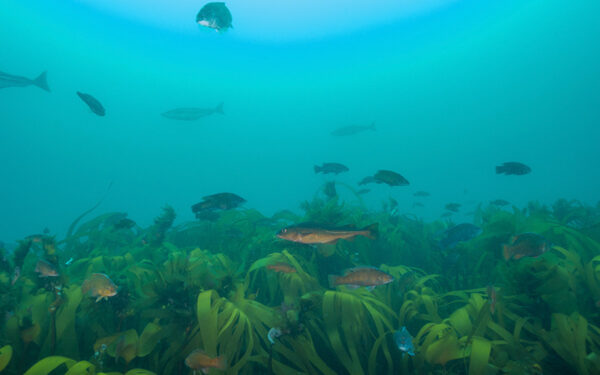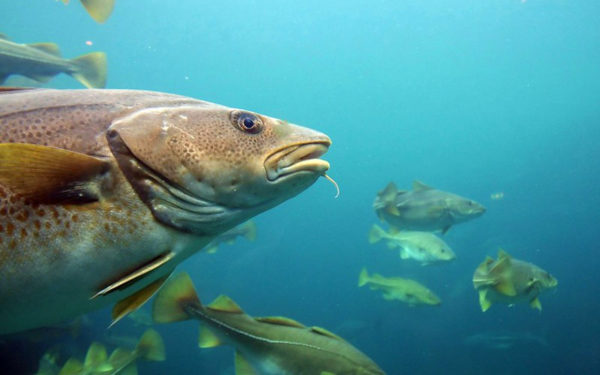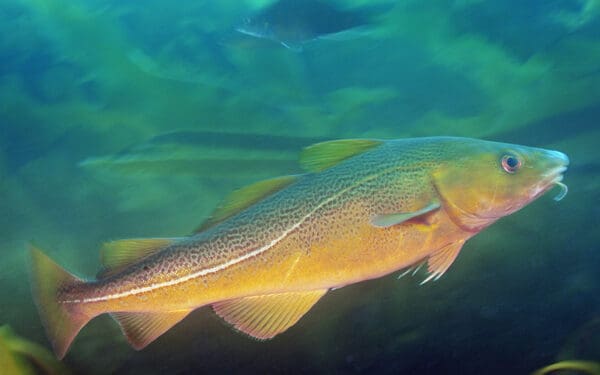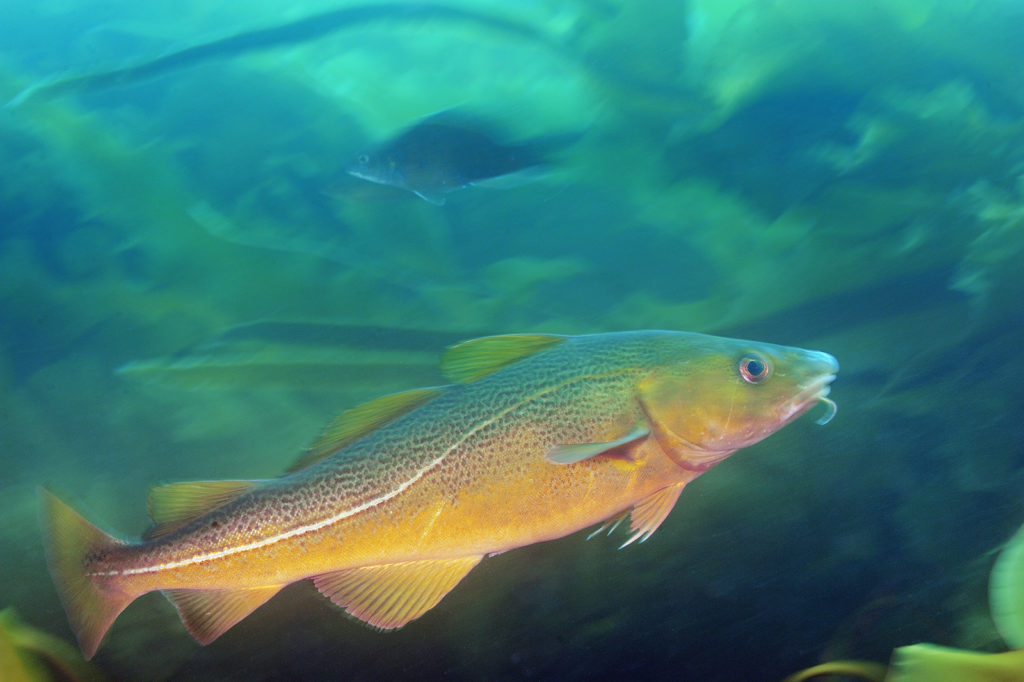
A new study shows that cod eggs and spawning females are especially vulnerable to temperature changes caused by climate change. Photo: Brian Skerry
We’re all feeling the warming impact of the climate crisis, with this summer on track to rank as one of the hottest on record. The heatwave extends into the ocean, where it impacts New England’s marine life – including Atlantic cod. Decades of intense overfishing and poor management decisions have decimated our once-abundant local cod. Warming waters make their already dire situation even more challenging.
According to a new study, rising water temperatures put fish eggs and spawning adults at higher risk than juveniles and adult fish. Since previous studies mostly only took adult fish into account, this close look at different life stages gives us a better idea of what the climate crisis means for our fisheries and how we can help save Atlantic cod. One big takeaway: protecting spawning areas, where the vulnerable fish are, is more critical than ever.
We sat down with CLF Senior Science Fellow Gareth Lawson to discuss the study’s implications and the future of Atlantic cod.
We often talk about how the warming ocean threatens marine life, but can you describe what it means for fish in New England?
The authors of this recent study looked at nearly 700 fish species, and they found that both developing eggs and spawning adults have narrower temperature ranges that they live in compared to adult fish.
The eggs make intuitive sense because they don’t have gills or the circulatory system that a bigger fish would have. They just can’t breathe when it gets too cold or too hot. But this study says we need to think about the spawning fish, too. They’re allocating so much of their energy to reproduction that they don’t have the reserves to deal with warmer temperatures.
How will Atlantic cod be impacted by the Gulf of Maine warming faster than nearly all other ocean waters on Earth?
Traditionally, when people thought about what species would survive climate change, it was based primarily on adults. But as this research shows, the reproductive cycle is crucial, and that means many more species than we thought will likely be impacted. For cod, that gives us even more reason to protect the spawning grounds. CLF is already calling for expanding the existing spawning protections – both more locations and for a longer duration. This study affirms that we need to protect the fish during that key period.
We also need to be thinking about the full puzzle: both the predators and prey of young cod are responding to climate change, too. When we look at the whole picture, not just one species, that’s called ecosystem-based management. And it’s not what we’re doing right now.
Can you talk a bit more about how better fisheries management could help save cod? What could we be doing differently?
Basically, fisheries management today is done mostly by setting quotas on how many fish can be caught within a specific fishery. In the case of New England cod, that has clearly not worked. Here, Atlantic cod populations on both Georges Bank and in the Gulf of Maine are overfished and far from recovering. We need to ensure that the current catch limits are adhered to strictly and supplement them with other management tools. Protecting spawning grounds is one of the best ways to do that.
There are currently some areas closed to fishing for specific times to protect spawning cod. But that ignores the science that spawning happens outside of those areas and outside of those times. We need to protect cod for more of the year and in more of the ocean.
With climate change, there also needs to be more flexible management founded on really good and up-to-date data. Right now, we basically assume that the fish population has the same kind of reproductive dynamics as it did 20 years ago. That’s not the case — things are different now because of climate change. We need to have assessment models that have climate folded into them and that will change as the climate does.
 Knowing that climate change is already impacting the ocean and our fisheries, how do we help cod survive into the future?
Knowing that climate change is already impacting the ocean and our fisheries, how do we help cod survive into the future?
Here’s the thing: According to the study, if emissions continue unabated, then by the end of this century, 60% of the fish studied will find themselves in temperatures that are too hot during the spawning time. But if we meet the Paris Agreement, then only 10% to 15% of them are in that zone. That’s a strong additional argument for reducing emissions. And that’s a definite way out of part of this climate pickle.
Now the question is, is there any hope for cod? I think that, yes, there is hope. We don’t fully understand how cod will respond to climate change. Still, there’s evidence that the different spawning groups of cod in New England differ in their adaptation to warmer temperatures. So that may mean there are pockets of genetic resilience out there.
However, with the way we’re overfishing right now, we aren’t giving them any chance to survive in the face of climate change. It’s a little like how individual spawning fish don’t have the energy reserves to deal with warmer temperatures. New England cod are so beaten down by overfishing that we’re setting them up to fail in handling the additional stress of warming temperatures. By giving them a break from that overfishing and protecting them during the spawning season on the spawning grounds, we’re giving them a forward pass. We’re giving them the best chance of being resilient to climate and surviving into the future.
Gareth Lawson, Ph.D., is a marine scientist. He comes to CLF from the Woods Hole Oceanographic Institution, where he and his lab researched fisheries, ecosystem dynamics, and climate change, as well as advanced technologies for sampling and tracking zooplankton and fish. His research has ranged from the Antarctic to the far offshore waters of the North Pacific, focused primarily on local waters of the Gulf of Maine and Georges Bank. Gareth earned a B.Sc. from McGill University, an M.Sc. from Memorial University of Newfoundland, and a Ph.D. from the Massachusetts Institute of Technology – Woods Hole Oceanographic Institution Joint Program in Oceanography.
You can help to save Atlantic cod by signing up for CLF emails to learn when you have an opportunity to advocate for progress.

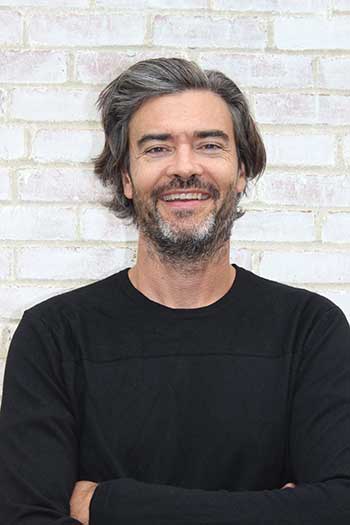 Knowing that climate change is already impacting the ocean and our fisheries, how do we help cod survive into the future?
Knowing that climate change is already impacting the ocean and our fisheries, how do we help cod survive into the future?